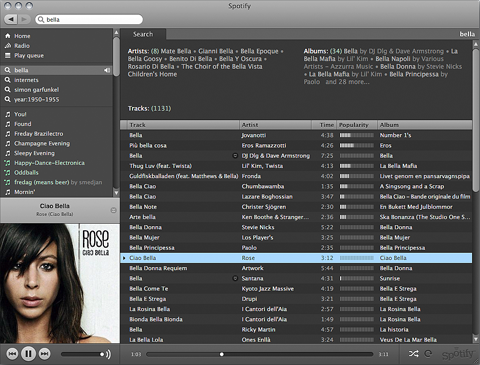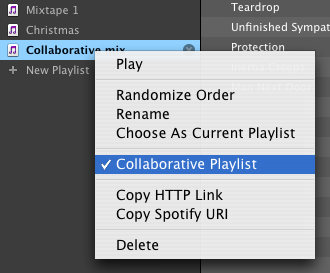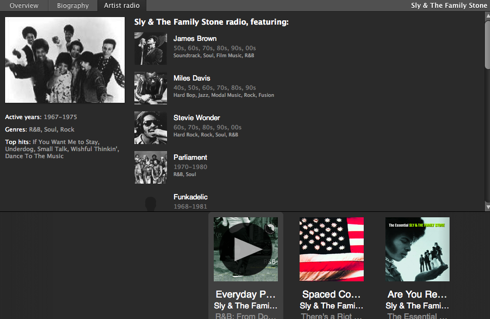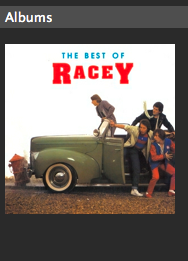Original URL: https://www.theregister.com/2009/02/12/spotify_review/
Spotify: We kick the tyres
Best thing since sliced vinyl?
Posted in Legal, 12th February 2009 12:52 GMT
Review Spotify, which opened up to all UK users this week, is a streaming music access service that's gathered an ecstatic response from some users. It's even "made illegal file sharing look like too much hard work" according to one Reg commenter. That's a pretty big claim - but then it's a pretty ambitious service. So what it is Spotify, and how does it stack up? And in an unforgiving commercial environment, will it last longer than a bat of a eyelid?
What's Spotify?
Spotify is attempting to be a universal jukebox - you click a button, and play any song or album instantly. This isn't a new idea: it's a free, ad-supported version of the US-only Rhapsody, or Napster's streaming service. Deezer does something similar. Spotify inserts adverts (currently every 10 songs or half hour or so) but offers a 99p a day, or a tenner-a-month subscription option to listen ad-free. There's no option to permanently keep recordings.
So the idea isn't new, and Google already offers a universal jukebox, albeit mostly unlicensed and low quality, with YouTube. What's the fuss about?
Primarily it's Spotify's responsiveness. The speed with which Spotify plays music is quite amazing. One of my Reg colleagues reckons it's faster than iTunes accessing its music library on your local hard disk. We didn't get the stopwatch out to test this, but the perception of near-instant playback is justified, and perception matters a lot. Click on a related artist, and the music continues without a hiccup (in practice, less than two seconds).
In this respect Spotify leaves web-based internet radio services like Last.fm and Pandora for dead. Spotify shuns Web 2.0 in favour of a native client on Windows and Mac, but it also employs some fetching (P2P is misleading here, since it's being pulled off a server).
Sound quality is so-so: at around 160kbps it's got that "standing outside the room" feel to it.

Spotify's agreeably minimal UI
The spartan UI based on iTunes - playlists on the left, library on the right - but without much of the clutter iTunes has accrued over the years. Everything else is pretty minimal too. That's because Spotify, which is still in stealth mode despite being in beta for well over a year, is still a minimal service. There's very few gimmicks: no widgets or scrobbling. Basically, you're scrolling vertically through lists and lists of albums. Spotify offers you five "similar artists", with instant navigation to more vertical lists, but there's no ability to fine tune a search, or browse by label. (As with other services, label information which is so useful in real life is missing).
As with Omnifone you can share playlists with other users. The UI for this is practically non-existant, however. A right click will paste a URI (with either http: or spotify: as the handler) onto the clipboard - it's up to you what to do with it. There's no UI to browse other users, let alone "stalk" them (as PlayLouder MSP, also in beta, permits) or chat to them. Playlists can also be shared in read-write format - which means anyone can edit it.

The "sharing" functionality is there, it's just pretty minimal too
spotify:user:userid:playlist:playlistid
or
spotify:track:trackid
Since Spotify is, er, "cloud based", your playlists are preserved as you move between machines. Do people share Spotify playlists? Perhaps they do, but not really here.
So for frills and extras, look elsewhere. Some artists have a brief page of biographical material, typically a fraction of the Wikipedia entry, and many more don't.
The Spotify repertoire
The company has earned itself a good reputation for being meticulous and above board with licensing. Licensing digital music is a nightmare, and requires a major investment, but Spotify is trying hard: the four majors are present, indie network Merlin, and Orchard.
And unless the first thing you want to hear is one of the big-name hold-outs - Led Zeppelin, The Beatles, Pink Floyd - you'll be pleasantly surprised at the extent of what's an offer. Here, at last, is all the stuff you never got round to hearing, or buying. Hear 15 versions of Spooky in a row! Hear all those old mid-70s Rolling Stones albums you never got round to buying!
Then, unfortunately, the gaps start to become apparent. Whole genres are absent (trance), and in some genres, there's a patchy make-do selection (techno with no Derrick May?). Well, maybe you don't dance to techno anymore, but you might want to dig out originals of your favourites: here's where a "universal" jukebox can and should provide a service over the best second hand record shop, by virtue of completeness and instant availability.

It's not radio, just links to a few more artist
Alas, many artists are represented only by their "greatest hits" collections, and this is often a cheesy re-re-packaging. This has some strange consequences. You can find many cover versions of She's Not There but not the Zombies' original - something hospital radio can deliver OK. Cult classics like The Small Faces' Ogden's Nut Gone Flake are absent. How do you make your own decent playlist or compilation when so much is missing? There's just one Funkadelic song.
Frustratingly too - I found this quite bizarre - where the original albums are included in Spotify, the year of release may be of re-release. With so few options with which to browse the service, this is needlessly confusing, but poor metadata plagues these services.
Now there are two caveats to these criticisms.
Firstly, they aren't necessarily the fault of Spotify. The huge gaps in a "universal" service are an illustration of the mess of digital licensing. If you go to Amazon.com, you won't find those missing Small Faces originals for MP3 download either. Not all labels have gone to the trouble of making high quality digital masters available to be licensees, and some haven't bothered making them at all.

No Funkadelic or Led Zepp - but will this do?
Secondly, the gaps are being filled. Only last week Patti Smith's Horses appeared, along with 1,600 new additions (updates are listed in this document) including ... Perry Como's Christmas Songs. Aaah.
But it does offer a sharp reminder that the real benefit of P2P isn't actually technical - it's completeness. Someone, somewhere will have what you're after - and fans also provide the bootlegs, concert recordings and other material not in the official catalog.
So for now, for all Spotify's riches, you end up listening to music you didn't get round to hearing in the first place, or buying. There may be actually reason you're listening to that music now, though: it just wasn't very good in the first place. Sorry, Keith & Mick - those mid-70s albums are alright, but they're not great records.
A future for Spotify?
Now the big question - I'm afraid it's one that involves a banned buzzword. Is Spotify's business model viable?
Well, my first reaction is obviously no, as a conventional business. There isn't enough money coming into the system. Yet with great technology and enthusiastic users, it's an attractive acquisition play: the way forward is through the EXIT door. With veterans from Skype on board, this is a path successfully taken before: find a rich buyer, and bail.
Ad supported music is a bust: it needs to scale to huge numbers to gain even pitiful revenue. Compare it with radio, which is struggling. Targetting users with ads - which are really sales vouchers - is expensive and unrewarding. And the ads need to be really, really irritating before users even consider paying for a subscription which turns the ads off. But users are promiscuous, and just as they graze from one social networking site to another, they graze between music services. When the ads exceed the pain threshold, they wander somewhere else.
Spotify is probably even worse for the music business, which appears to have given away the house under the misguided belief that it "has to compete with free" by being free, implying we won't pay for stuff. In a couple of days, I knocked dozens of potential purchases off my "CDs to buy" list, and made few discoveries - which translated into just a couple CDs.
So the challenge for both Spotify and music business is to convert us into paying subscribers somehow. What tricks might Spotify have to do this? Well, there are other options.
One is obviously licensing it to ISPs, websites or even Apple itself, as a streaming feature in iTunes. Don't forget that Apple's growth is down to making great music hardware, all content delivery is something that makes the hardware more attractive.
Another option is to make the subscription really attractive. How about downloads? Executives have hinted at adding features to the pay-for version.
The people with the most to worry about from Spotify are the much-hyped web-based services such as CBS' Last.fm and Pandora. Spotify really blows them away. By backing mid-noughties fads ("deliver everything through the web browser", "social recommendation") they backed at least a couple of dead horses.
So Spotify deserves a big round of applause - the first music service launch with a bit of a "Wow! How do they do that?" factor. But it has some way to go to match the deep integration of social options that PlayLouder MSP provides licensees with (chat, stalking, etc), and no downloads. And it will need to sprout more of these and perhaps a new approach to the market before it's viable. ®